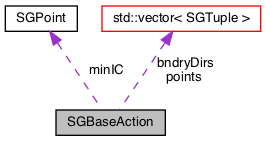|
SGSolve
|
Describes an action in the game. More...
#include <sgbaseaction.hpp>


Public Member Functions | |
| SGBaseAction () | |
| Constructor. More... | |
| SGBaseAction (int _state, int _action) | |
| Constructor. More... | |
| SGBaseAction (int _numPlayers, int _state, int _action) | |
| Constructor. More... | |
| ~SGBaseAction () | |
| Destructor. | |
| bool | getIsNull () const |
| Returns true if the action is null. | |
| int | getAction () const |
| Returns the action. | |
| const vector< SGTuple > & | getPoints () const |
| Returns the points array. | |
| const vector< SGTuple > & | getBndryDirs () const |
| Get method for bndry dirs. | |
| const vector< vector< int > > & | getTuples () const |
| Returns the tuples array. | |
| int | getState () const |
| Returns the state. | |
| bool | hasCorner () const |
| Returns whether or not the action has a corner. | |
| const SGPoint & | getMinICPayoffs () const |
| Returns the minimum IC continuation values. | |
| const vector< SGTuple > & | getBindingContinuations () const |
| Returns the array of binding continuation values. | |
| void | setMinICPayoffs (const SGPoint &newMinIC) |
| Sets the minimum IC continuation values. | |
| void | setTuples (const vector< vector< int > > &newTuples) |
| Sets the tuples array. | |
| void | setPoints (const vector< SGTuple > &newPoints) |
| Sets the points array | |
| void | setPointsAndTuples (const vector< SGTuple > &newPoints, const vector< vector< int > > &newTuples) |
| Sets the points and tuples arrays. | |
| void | setCorner (bool tf) |
| Sets the corner indicator. More... | |
| bool | isCorner (const int p, const int k) const |
| Returns whether or not the minimum IC payoff is feasible. | |
| template<class Archive > | |
| void | serialize (Archive &ar, const unsigned int version) |
| Serializes the action using the boost::serialization library. | |
Protected Attributes | |
| int | numPlayers |
| int | state |
| int | action |
| SGPoint | minIC |
| vector< SGTuple > | points |
| vector< SGTuple > | bndryDirs |
| vector< vector< int > > | tuples |
| bool | isNull |
| bool | corner |
Friends | |
| class | boost::serialization::access |
Describes an action in the game.
Stores IC region information for a single action. Stores the action, minimum incentive compatible payoffs, points of intersection between the IC region and the expected feasible set, and indices of the tuples that generate the points of intersection.
|
inline |
Constructor.
Constructs a null action associated with the given SGEnv.
|
inline |
Constructor.
Grandfather in two-player code.
|
inline |
Constructor.
Constructs an action for the given state and action index in the given environment.
|
inline |
Sets the corner indicator.
< Sets the indicator for whether there is a point at which both players constraints bind, when there are two players.
|
protected |
The index of the action profile.
|
protected |
Stores the slope of the frontier at the extreme payoffs.
|
protected |
Flag that indicates that the minimum IC continuation value is feasible.
|
protected |
Flag to indicate that this is the place holder "null" action.
|
protected |
The minimum continuation value to support incentive compatibility, relative to the current threat tuple. In particular, this is the maximum over all deviations of the expected threat point under the deviation, plus (1-delta)/delta times the static gains from deviating.
|
protected |
Should be two or three in all current implementations.
|
protected |
Extreme points of the set of expected feasible continuation values at which some player's incentive constraint binds. points[i] is an SGTuple consisting of either 0 or 2 SGPoint objects, which are the extreme binding payoffs on player i's incentive constraint. The convention is that the first element of the tuple is the northern or easternmost of the two binding payoffs.
|
protected |
The state in which this action profile can be played.
|
protected |
The vector tuples[i][j] points to the element of SGApproximation::extremeTuples whose expectation is just clockwise relative to points[i][j].